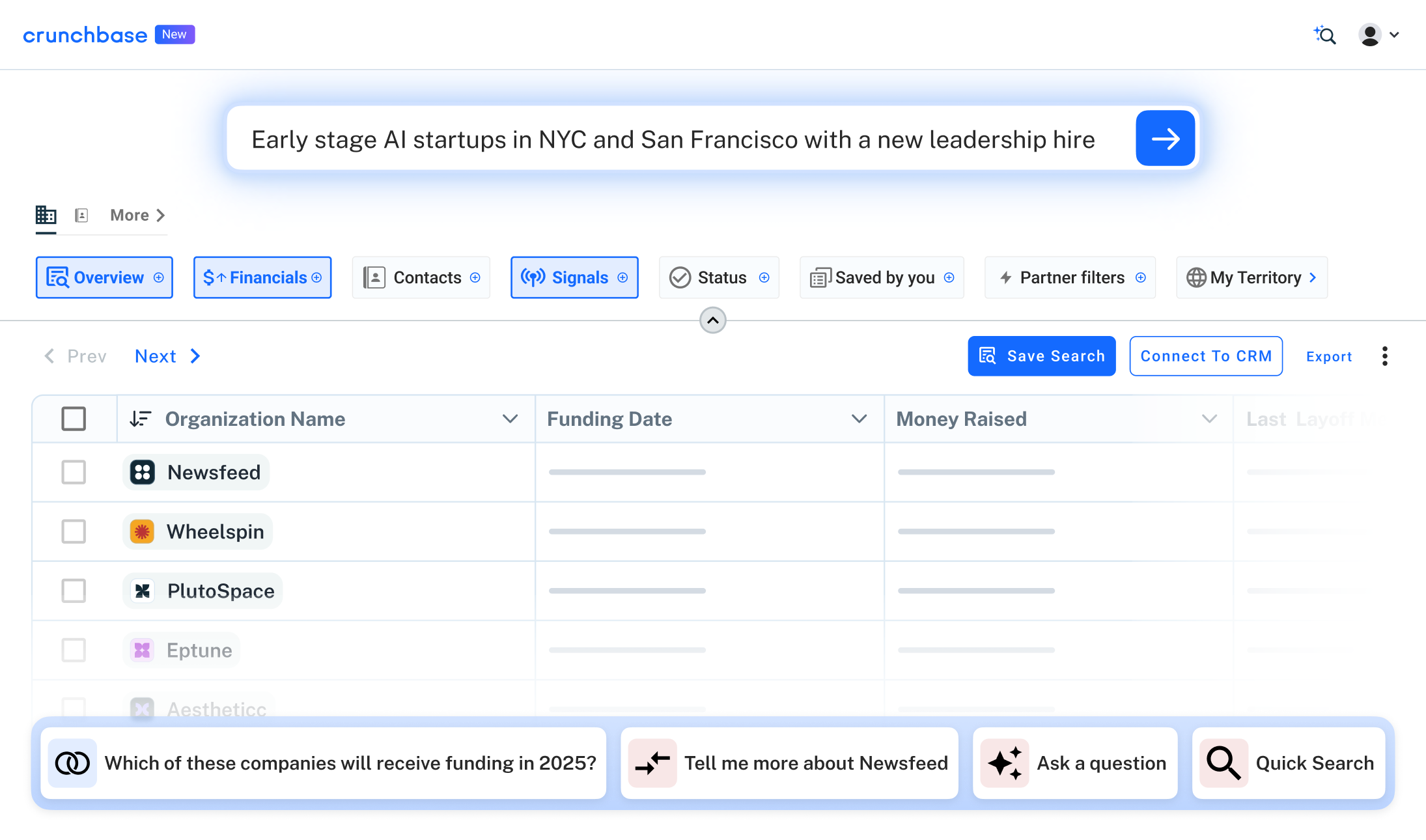If you own a business, lead a sales team, or are otherwise interested in how best to create a solid sales ecosystem within your organization that is conducive to growth, this article on sales operations (sales ops) is for you.
To set up your company to scale in any meaningful way, sales operations—sometimes referred to as business operations or sales support—need to be in full swing, laying the groundwork for and supporting your sales team’s efforts.
The following provides a definition of sales ops and what it does, offers insights into how to organize and operate a sales operations function in your company, and relays some best practices for running a successful sales operations team.
Team management made easy.
Crunchbase’s team admin features for Pro and Enterprise users make it easy to manage access and permissions for multiple users.
What is sales operations?
The idea of sales operations—founded on the premise that good information combined with sound analysis will drive sales teams to better prospecting and higher closing rates—has been around since at least the 1970s. As time progressed and technology evolved, the sales operations definition has followed suit, becoming much broader in scope and application. Today, the role of sales operations has taken on both strategic and tactical significance, informing every phase of the sales process. With heavy reliance on data analytics and reporting, sales ops often oversee everything from lead management to sales strategy to incorporating automation to increase efficiencies across the sales spectrum.
In essence, sales strategy and operations have one overarching purpose—to enable sales teams to sell. Sales teams consistently reach their goals when sales operations do their job effectively.
Sales operations vs. sales enablement
Sales operations are often confused with the similar-sounding term, sales enablement. While the two indeed share the common cause of seeing sales increase and revenue rise, sales enablement is actually a part of sales operations. As the term implies, sales enablement is the slice of sales ops that implements—or enables—the strategies that sales ops develop. In other words, sales enablement occupies the tactical space on the sales ops spectrum.
What are the responsibilities of sales operations?
Sales operations problem-solving is multifunctional. Depending on the size and sophistication of an organization, sales operations responsibilities typically involve most, if not all, of the following.
- Data management and forecasting. One of the primary functions of sales ops is to gauge the effectiveness of a particular campaign or sales process and the viability or usefulness of any specific product or service the company offers. To be effective in these endeavors, sales ops must collect and evaluate internal sales team and product performance data as well as external market data and sales intelligence on competitor performance. This data is also helpful in forecasting how current processes will hold up to emerging trends.
- Setting sales strategy. Of course, the purpose of gathering this data and analyzing it is to develop action items to set both the sales and operations teams up for success. To this end, sales ops’ job is to convert these metrics into tangible action items, where warranted, to improve sales plans and processes in order to meet current or newly established goals.
- Generating leads. Since sales teams depend on the volume and quality of leads they receive, one of sales ops’ primary responsibilities is handling all lead generation tasks. Doing so frees the sales team up to sell and ensures that the leads being furnished to the sales reps meet sales standards and criteria. Sales ops’ roles in generating leads include both the strategic side of lead generation—making sure marketing and sales are aligned in important aspects of sales, such as what constitutes a qualified lead—and the tactical sales enablement side, such as maintaining lead generation and follow up systems, and setting sales appointments with prospects.
- Sales rep support. Since sales operations’ function is to set sales representatives up for success, it stands to reason that supporting sales reps in tangible aspects of their jobs—like writing contracts and managing transactions—would be a sales ops function. Sales ops often make their team available to help sales reps with less tangible soft skills development, such as providing training and tutelage in effectively managing their time and working collaboratively with other sales team members.
- Sales team advocacy. In its role as sales team support, sales operations will often advocate for the needs of the sales function. This could entail ensuring the sales reps have all the tools and training they need to do their jobs and that the company budget takes these needs into account.
- Performance and incentive program management. Often, sales ops oversee sales reps’ salaries, bonuses and other incentive programs that impact their current or future earnings. In larger companies, sales operations may even help sales managers with sales team performance management, including fashioning and distributing rewards and engaging in remedial sales process training where warranted.
- Parsing out territories. The assignment of territories to individual sales representatives is a significant function often relegated to the sales ops managers. One reason territory assignment usually ends up in the sales ops wheelhouse is its close relationship to the sales team’s performance evaluations and incentive programs. What territory a sales rep covers can impact their available prospects, the hours they will likely work, and even the commissions or other compensation they will receive. Territory assignment is such an important part of sales that companies often rely on ops analytics to choose the best—and sometimes most deserving—sales reps for each territory.
- Sales team structure. Sales operations help the sales teams optimize their human capital. It’s sales ops’ job to figure out how to align each sales rep with the right customer persona—so both the customer and the sales rep can exceed each other’s expectations—while making sure the sales rep and sales territory line up in a way that increases the probability of the team’s overall success.
- Enhance communications. Sales ops help strengthen sales teams by supporting internal communications. Often, sales ops will work with IT to roll out a communications platform that allows for real-time texting and file-sharing. Sales ops will also work with IT in choosing and enhancing the company’s customer relationship management software. Both tech tools are essential to facilitating information and data exchanges between sales reps and sales enablement personnel, marketing and other internal stakeholders.
- Onboarding and training. Sales ops may oversee the onboarding and training of sales reps, ensuring they are set up to succeed by orienting them to the company’s culture, sales processes, knowledge base and other resources.
- Continuous improvement training. Sales training is not something that is only undertaken during onboarding. Sales ops ensure that all sales reps—newbies and seasoned top performers alike—receive the training on products and processes they need to stay on top of their game.
How does a sales ops team work?
Since sales ops are in charge of so many functions at one time, many companies divide the responsibilities into three staff positions, often overseen by a director or vice president of sSales operations. Typical sales operations roles will include:
- Sales operations analysts. These individuals know how to take mounds of data and transform them into meaningful metrics, so decision-makers gain the insights they need to make strategic decisions about setting sales performance criteria. In some companies, analysts will be divided into two or more teams to specialize in prospecting, market research, closing metrics, etc.
- Sales operations representatives. Sometimes called sales enablement staff, these reps roll up their sleeves to do whatever it takes to make the sales team’s jobs easier. They might conduct prospecting calls, set appointments for the sales reps, and follow up after a sale is won or lost. Sales ops reps will be involved in finalizing sales contracts or, in instances where no sale was closed, trying to move the prospect back into the sales funnel.
- Sales operations manager. Usually the person reporting to senior management, the sales ops manager oversees the ops analysts and reps, facilitates training for the sales staff, translates analytics into proposed action items, and acts as a liaison with the sales manager.
Tips for running a sales operations team
Running a successful sales ops team boils down to clearly defining—and, when necessary, redefining—the department’s purpose, putting the right people in the right sales ops seats, and staying focused on your sales team at all times. The following best practices may prove helpful as you develop or look for ways to improve your sales ops team.
- Clarify your mission. The most important thing you can do to set your sales ops team up for success is to be clear on the department’s mission from the start. Every team member needs to know the purpose of sales operations and understand who they are working for in their role. Without a defining mission statement and transparent objectives, you and your team will be rudderless. Mission and purpose guide actions.
- Define each function’s responsibilities. You want to ensure that job functions don’t overlap or, even worse, that members of your team are not working at cross-purposes. Give each team member a defined job description, complete with deliverables, a timetable and KPIs.
- Create a solid knowledge base. Establishing processes, procedures and best practices is only useful if they are accessible and understood. Make sure your own sales ops teamas well as the sales reps they work to support—have a centralized knowledge base to access what they need and continuously train on the skills they need to leverage the information to its greatest advantage.
- Be a full-spectrum sales ops team. From lead generation to opportunity to close to retention, keep support for your organization’s sales team at the forefront of everything your team does. Constantly share key information and insights with the sales representatives and seek feedback regularly to ensure optimal communications.
- Always opt into the best tech solutions. Whether it’s a way to find and qualify new and better prospects, gauge the efficacy of a current marketing outreach program, gain valuable insights into current and future market conditions, or a way to dig deep into hard-to-capture private company data, look for an efficient all-in-one solution that provides the data you need to scale.
Crunchbase helps sales ops succeed
Running an organization’s sales ops function is always challenging, especially when it comes to meeting the ever-changing needs of a growing company. Supporting your sales team with the right systems and tools sets you and your sales operations team up for success.
With sales prospecting tools that use sales intelligence to help you quickly identify the right accounts and live market research data that allows you to spot trends and identify qualified prospects, Crunchbase offers the all-in-one solution you need to keep your sales ops teams performing at the highest levels.
And, Crunchbase’s team admin features for Pro and Enterprise users make it easy to manage access and permissions for multiple users from the same team and/or company. With single sign-on, group invoicing, seat management, and Salesforce Sync connection, teams can operate more efficiently on Crunchbase. Find more information about team management features in our Knowledge Center.
.svg)







